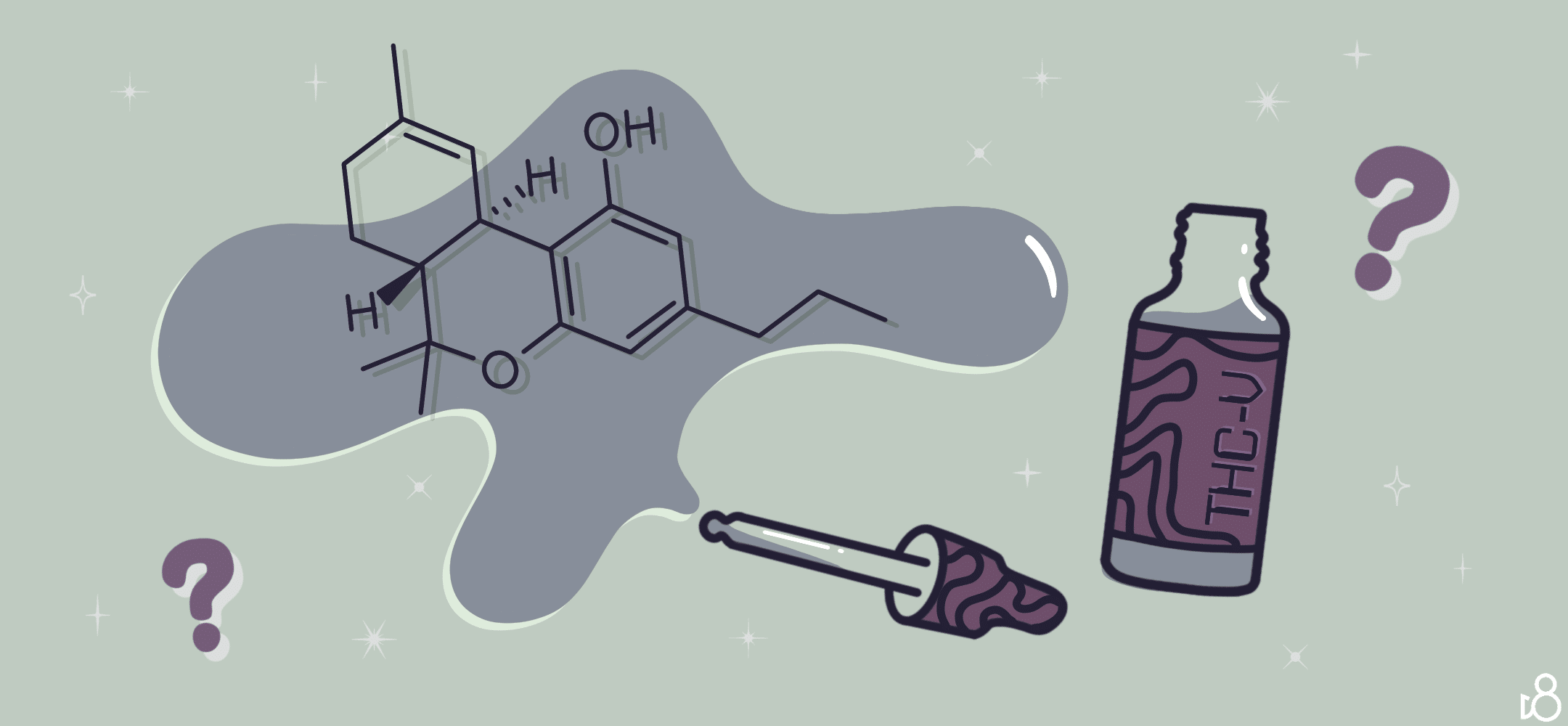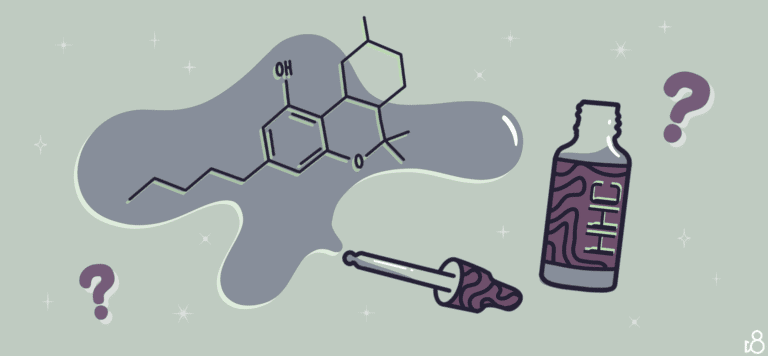THCV Strains: The Ultimate Guide
Ready for a trip through the wonders of THCV in marijuana? Congratulations, you’ve struck gold! THCV, short for tetrahydrocannabivarin, tucked away in certain unique cannabis strains, delivers an exhilaration far from your typical THC experience. This unsung hero offers a slew of health benefits. Keep reading to discover why this lesser-known compound could turn out to be your ace in the hole.
In this comprehensive guide, we’ll take a closer look at THCV strains and what sets them apart from other cannabis strains. We’ll also cover the different types of THCV strains available and explore the potential benefits of using THCV strains for medicinal purposes.
Delta-8 THC Products
Delta-9 THC Products
Delta-10 THC Products
Shop our top brands:

What is THCV?
THCV, or tetrahydrocannabivarin, is a cannabinoid found in some strains of cannabis. It is structurally similar to THC, but with a few key differences. THCV is thought to have a more mild psychoactive effect than THC, and it is believed to have a different set of potential health benefits.
THCV was first discovered in the 1970s, but it wasn’t until recently that researchers began to delve deeper into its potential medicinal properties. While more research is needed to fully understand the effects of THCV, early studies suggest that it may be effective for managing certain conditions and symptoms.
The History and Discovery of THCV
THCV was first discovered in the 1970s by researchers who were studying the chemistry of cannabis. It was initially thought to be a minor cannabinoid that was present in small amounts in some strains of cannabis. However, as researchers continued to study THCV, they began to realize that it was more abundant in certain strains of cannabis and that it had a unique set of properties.
Over the years, THCV has been the subject of numerous studies and clinical trials, as researchers continue to explore its potential medicinal properties. Today, THCV is considered a promising cannabinoid with a range of potential health benefits.
The Chemistry and Composition of THCV
THCV is a cannabinoid, which means it is a chemical compound found in cannabis. It is structurally similar to THC, but with a few key differences. THCV has a shorter chain of atoms and a different arrangement of double bonds, which gives it a slightly different chemical structure.
THCV is found in a number of different strains of cannabis, but it is typically present in smaller amounts than THC. Some strains of cannabis are high in THCV, while others are low in THCV. The amount of THCV in a particular strain of cannabis can vary depending on a number of factors, including the strain’s genetics, growing conditions, and processing methods.
Marijuana Strains with most THCV
THCV is a cannabinoid that is found in some strains of cannabis, but it is typically present in smaller amounts than THC. Here are a few strains that are known to have high levels of THCV:
- Durban Poison: This is a classic sativa strain that is known for its high THCV content. It is thought to have energizing and uplifting effects, making it a popular choice for those looking to boost their mood and focus.
- Doug’s Varin: This is a rare strain that is known for its high THCV content. It is thought to have uplifting and energizing effects, as well as a high CBD content.
- Jack the Ripper: This is a sativa-dominant hybrid strain that is known for its high THCV content. It is thought to have energizing and uplifting effects, making it a popular choice for those looking to boost their mood and focus.
- Tangie: This is a sativa-dominant hybrid strain that is known for its high THCV content. It is thought to have uplifting and energizing effects, as well as a tropical flavor profile.
It’s important to note that the THCV content of a particular strain can vary depending on a number of factors, including the strain’s genetics, growing conditions, and processing methods. If you are looking for a strain with high THCV content, it’s a good idea to speak with a dispensary or a trusted source for guidance.
How THCV Strains Compare to Other Cannabis Strains
THCV strains are different from other cannabis strains in a few key ways. For one, THCV strains are typically lower in THC and higher in CBD than other cannabis strains. This means that they may have a more balanced effect on the body and mind, with less intense psychoactive effects.
THCV strains are also believed to have a different set of potential health benefits than other cannabis strains. For example, some studies have suggested that THCV may be effective for weight loss, while others have found that it may have anti-inflammatory properties.
The Different Types of THCV Strains
There are many different types of THCV strains available, each with its own unique set of properties and potential benefits. Some common THCV strains include:
- Pineapple Purps: A sativa-dominant strain with a sweet and tropical flavor. Pineapple Purps is known for its high THCV content and may be effective for reducing anxiety and increasing focus.
- Doug’s Varin: A sativa-dominant strain with a sweet and fruity flavor. Doug’s Varin is known for its high THCV content and may be effective for reducing appetite and promoting weight loss.
- Elektra: A hybrid strain with a sweet and earthy flavor. Elektra is known for its high THCV content and may be effective for reducing anxiety and improving mood.
- Dancehall: A sativa-dominant strain with a sweet and tropical flavor. Dancehall is known for its high THCV content and may be effective for reducing anxiety and increasing energy.
Potential Benefits of THCV Strains
THCV strains are believed to have a range of potential health benefits. While more research is needed to fully understand the effects of THCV, early studies suggest that it may be effective for managing certain conditions and symptoms. Here are some potential benefits of THCV strains:
- Diabetes: THCV has been shown to improve insulin sensitivity in animal studies, which may make it a potential treatment option for diabetes.
- Parkinson’s disease: THCV has been shown to improve tremors and other symptoms of Parkinson’s disease in animal studies.
- Anxiety: THCV has been shown to have anti-anxiety effects in some studies, making it a potential treatment option for anxiety disorders.
- Epilepsy: THCV has been shown to have anti-seizure effects in animal studies, making it a potential treatment option for epilepsy.
- Appetite: THCV has been shown to reduce appetite in some studies, making it a potential treatment option for conditions that involve abnormal eating behaviors.
- Alcoholism: THCV has been shown to reduce alcohol cravings and improve alcohol abstinence rates in animal studies, making it a potential treatment option for alcoholism.
- Addiction: THCV has been shown to reduce drug-seeking behaviors in animal studies, making it a potential treatment option for addiction.
- Mental health: THCV has been shown to have antidepressant and antipsychotic effects in some studies, making it a potential treatment option for mental health conditions.
- Sleep: THCV has been shown to improve sleep quality in some studies, making it a potential treatment option for insomnia and other sleep disorders.
- Pain relief: THCV has been shown to have pain-relieving effects in some studies, making it a potential treatment option for chronic pain.
- Inflammation: THCV has been shown to have anti-inflammatory effects in some studies, making it a potential treatment option for conditions that involve inflammation.
- Heart health: THCV has been shown to improve heart health markers in some studies, making it a potential treatment option for conditions that affect the heart.
- Cancer: THCV has been shown to have anti-tumor effects in some studies, making it a potential treatment option for cancer.
- Bone health: THCV has been shown to improve bone density and strength in animal studies, making it a potential treatment option for conditions that affect bone health, such as osteoporosis.
- Skincare: THCV has been shown to have anti-aging and skin-protective effects in some studies, making it a potential treatment option for skincare.
- Aging: THCV has been shown to have anti-aging effects in some studies, making it a potential treatment option for the signs of aging.
It’s important to note that more research is needed to fully understand the effects of THCV and to determine its safety and effectiveness for these and other potential uses.
Finding THCV Strains Near You
If you’re interested in trying THCV strains, you may be wondering where to find them. THCV strains are still relatively rare, so they may not be available at all dispensaries. However, some dispensaries may carry THCV strains or be able to special order them for you. It’s always a good idea to call ahead and check with your local dispensary to see what THCV strains they have available.
In addition to dispensaries, you may also be able to find THCV strains online. Just be sure to do your research and only purchase from reputable sources.
The Effects of THCV on the Body and Mind
THCV is a psychoactive compound, which means it can produce effects on the body and mind when it is consumed. However, the effects of THCV are thought to be more mild and subtle than the effects of THC.
THCV is believed to have a range of effects on the body and mind, including:
- Mild psychoactive effects: THCV is thought to have mild psychoactive effects, which means it may produce a feeling of altered consciousness or a change in perception. However, these effects are typically less intense than the effects of THC.
- Reduced anxiety: Some studies have found that THCV may have anti-anxiety effects, which means it may help to reduce anxiety and improve mood.
- Increased focus: THCV is thought to have stimulating effects, which may help to improve focus and concentration.
- Reduced appetite: THCV is believed to have appetite-reducing effects, which may make it helpful for managing conditions that involve abnormal eating behaviors.
- Improved insulin sensitivity: THCV has been shown to improve insulin sensitivity in animal studies, which may make it a potential treatment option for diabetes.
- Anti-inflammatory effects: THCV has been shown to have anti-inflammatory effects in some studies, which may make it helpful for conditions that involve inflammation.
THCV and Weight Loss: Is There a Connection?
Some studies have suggested that THCV may be effective for promoting weight loss. This may be due to THCV’s ability to regulate the body’s metabolism and energy balance.
One study found that THCV reduced food intake and increased energy expenditure in obese mice, leading to significant weight loss. Another study found that THCV reduced appetite and body weight in obese humans.
While these findings are promising, more research is needed to fully understand the relationship between THCV and weight loss and to determine its safety and effectiveness for this use.

Conclusion
THCV strains are a unique and lesser-known type of cannabis that may offer a range of potential health benefits. While more research is needed to fully understand the effects of THCV, early studies suggest that it may be effective for managing certain conditions and symptoms. If you’re interested in trying THCV strains, be sure to do your research and speak with a healthcare professional before making any decisions. With the right strain and dosage, THCV may be a promising addition to your wellness routine.
Here are some FAQ’s
Is THCV safe to use?
More research is needed to fully understand the safety of THCV. Some studies have suggested that THCV may be safe to use in certain doses, but more research is needed to confirm this. If you are considering using THCV, it’s important to speak with a healthcare professional about the potential risks and benefits.
Is THCV legal?
The legal status of THCV varies by jurisdiction. In some places, THCV is legal and can be purchased and consumed just like other cannabis products. In other places, THCV is illegal or only available for medicinal use with a prescription. It’s important to check the laws in your area before using THCV or any other cannabis products.
How do I find THCV strains?
THCV strains are still relatively rare, so they may not be available at all dispensaries. However, some dispensaries may carry THCV strains or be able to special order them for you. It’s always a good idea to call ahead and check with your local dispensary to see what THCV strains they have available. In addition to dispensaries, you may also be able to find THCV strains online. Just be sure to do your research and only purchase from reputable sources.
Is THCV safe to use during pregnancy or breastfeeding?
There is not enough research to determine the safety of THCV during pregnancy or breastfeeding. Until more is known, it is best to avoid using THCV or any other cannabis products during these times. If you are pregnant or breastfeeding, it’s important to talk to your healthcare provider about the risks and benefits of using THCV or any other cannabis products.
How do I consume THCV?
THCV can be consumed in a number of different ways, including smoking, vaping, and consuming edibles. The best method for you will depend on your personal preferences and needs. If you are new to THCV, it’s a good idea to start with a low dose and work your way up slowly to find the right dosage for you.
What is the recommended dosage of THCV?
There is no standard dosage of THCV, as it can vary depending on a number of factors, including your age, weight, and overall health. It’s important to start with a low dose and work your way up slowly to find the right dosage for you. It’s also a good idea to speak with a healthcare professional before using THCV to get guidance on the appropriate dosage for your needs.
Are there any potential side effects of THCV?
THCV is believed to be generally well-tolerated, but like any other substance, it can cause side effects in some people. Some potential side effects of THCV include dizziness, dry mouth, and changes in blood pressure. If you experience any side effects while using THCV, it’s important to speak with a healthcare professional for guidance.
Can THCV be addictive?
Some studies have suggested that THCV may have potential as a treatment for addiction, as it has been shown to reduce drug-seeking behaviors in animal studies. However, more research is needed to fully understand the relationship between THCV and addiction. It’s also important to note that all cannabis products, including THCV, can be habit-forming and may lead to dependence with long-term use. If you are concerned about addiction, it’s a good idea to speak with a healthcare professional for guidance.







